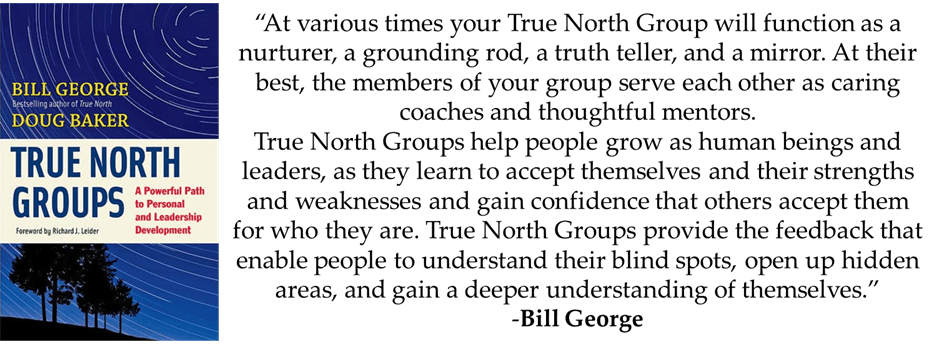There is immense power in small groups. But not just any small group.
We mean small groups that meet periodically to support each other at the deepest levels in a safe place of confidentiality, trust, and respect.
We’re not talking about social clubs, book clubs, Bible studies, 12-step meetings, mastermind groups, circles of trust, clearness committees, elder councils, or personal boards of directors. No doubt, these are valuable and can help build community and relationships.
The small groups we mean may use different names, but they share critical characteristics. Here are some examples:
- “True North Groups” (Bill George and Doug Baker): “a safe place for deep, intimate discussions about life’s most challenging questions… (which) help us follow our True North… (which is) what is most important to us in life: our beliefs, our most cherished values, our passions and motivation, and the sources of satisfaction in our lives.”
- “Mutual Support Groups” and “Peer Leadership Groups” (Christopher Gergen and Gregg Vanourek): These groups “provide support, inspiration, guidance, and accountability, making a big impact on our learning, growth, work, and quality of life.” These groups are a safe place where participants don’t try to “fix” one another. Instead, they support one another.
- “YPO Forums” (Young Presidents’ Organization): “Every CEO needs somewhere to turn for the insight and perspective only trusted peers can provide. In YPO, the supreme sounding board is forum. Around the world in 3,800 forums, small groups of members… meet in an atmosphere of confidentiality, respect, and trust. Most members say forum is their most valued asset.”
- RoundTables™ (Vail Alliance): Year-long small-group dialogues with monthly meetings. They consist of small groups exploring purpose, values, vision, and new possibilities and plans, with personal stories, questions, and experiences shared in dialogue.

The Benefits of Small Groups
The benefits of these small groups can be extraordinary. When run well, they provide:
- support and encouragement on issues and concerns that matter
- a forum for helping us achieve clarity about our ideas, intentions, plans, challenges, and dreams
- guidance (when requested) on high-priority issues
- an opportunity for brainstorming and problem-solving when we run into stumbling blocks
- accountability for sticking with our commitments
- a place of trust and openness to work through difficult challenges
- a source of support and inspiration

Crafting Your Life and Work Course
Regain clarity, direction, and motivation for your next chapter, starting with a powerful foundation of self-awareness and commitment to your values and aspirations.
Best Practices of Small Groups
These small groups can be transformative in our lives if they’re properly constituted and conducted. Here are some of the characteristics of these small groups:
- They meet weekly or monthly from two to four hours in private places to ensure confidentiality and avoid interruptions. Participants’ homes are often used.
- The groups should be small to allow for deep connections. We recommend groups of no more than eight people.
- The groups establish norms to guide their behavior. Typical norms are to start and stop on time, honor confidentiality, support each other, get “real,” be humble, respectful, and nonjudgmental, build trust, and have fun. Some groups use the concept of a “red flag” anyone can raise if they feel someone is straying from the norms.
- The agenda for a typical meeting might be as follows:
- Brief “check-in” by each member to describe how they’re currently feeling.
- Recap of the norms.
- Determining if anyone needs special time for a burning issue.
- Sharing around the circle on topics like family, relationships, physical or mental health, work, and wellbeing.
- Occasional discussion of a preselected topic.
- Time, date, and place of next meeting.
- A brief “check-out,” expressing each participant’s honest feelings about the meeting.
- One group member with facilitation skills can guide the meetings, or, ideally, facilitation can rotate among members.
- The facilitator lists issues raised that don’t require immediate attention in a “parking lot” for future conversation.
- Some groups use a timekeeper to keep the session on schedule unless all agree a deviation is needed.
- Most groups ask members to guard these meetings as a very high priority on their calendars. Some groups ask people who miss too many meetings to leave.
- Sometimes, these small groups plan an annual retreat for two or three days to make deeper connections over meals and fun activities.
- Periodically, the group should assess how it’s doing. Are new norms needed? Should the format change? What more can be done to meet the needs of members?
- Though virtual meetings are often more convenient, most participants in small groups feel strongly that in-person meetings are best. There’s something powerful about being in the same room together—and fully present with each other.

Strengths Search
We all have core strengths–the things in which we most excel. Take this self-assessment to determine your core strengths so you can integrate them more into your life and work.
Starting a Small Group
Anyone can start a small group, and they can start small. Bob started a small group with only two other members. Over a couple years, it grew to eight people.
Groups can be same-gender or mixed-gender. They can have people of similar ages or different generations. In our experience, many kinds of group compositions can work well if attention is paid to good group processes.
Be wise about choosing whom to invite. Here are potential criteria to consider:
- openness to deep sharing
- commitment to attending group meetings
- authenticity
- honesty
- integrity
- trustworthiness
- humility
- emotional intelligence
- good listening skills
- diverse backgrounds, experiences, and perspectives
- willingness to be forthright and vulnerable
People who are arrogant, ego-driven, and materialistic aren’t good candidates. It may be difficult to “uninvite” group members, so be thoughtful up front. The whole group should agree before admitting a new member.
It’s valuable at the outset to have a retreat where members can define norms and share their personal stories (or “lifelines”) with each other. Each member should recount their life stories with all the ups, downs, and crucible moments that shaped their character. The purpose is to begin to get to know each other at a deeper level. If new members join over time, then the group should be sure to exchange lifelines again.
Topics to Cover in a Small Group
Over the years, these small groups can help members with many challenging issues, such as:
- family or professional crises
- marriage
- divorce
- children and parenting
- relationships
- common traps of living
- leadership derailers
- aging parents
- deaths
- accidents
- burnout
- life and work transitions

Leadership Derailers Assessment
Take this assessment to identify what’s inhibiting your leadership effectiveness. It will help you develop self-awareness and identify ways to improve your leadership.
Of course, groups don’t need to focus only on challenges. Groups can and should also talk about uplifting and exciting things like purpose, values, vision of the good life, strengths, passions, goals, fulfillment, opportunities, priorities, work/life balance, renewal, legacy, and more.
It takes courage to be open and vulnerable in these groups. Many of us aren’t used to such intimacy outside our spouse or partner relationships. In our experience, those concerns soon dissipate as one finds trusted souls who can be honest and supportive of one another as we all navigate the choppy waters of life.
It’s exceedingly difficult to live the life we want if we’re alone in dealing with life’s ups and downs. It can be a mistake to rely only on our spouse, partner, or best friend for such support.
Conclusion
When composed and conducted well, these small groups can be a powerful force for improving our quality of life. They help us learn, grow, and realize our potential. They bring depth and richness to our lives. We heartily recommend them.
“We are each of us angels with only one wing, and we can only fly by embracing one another.”
-Luciano De Crescenzo
Reflection Questions
- Are you lacking deeper connections in your life?
- Do you have questions or issues you’d like to explore with trusted companions?
- Can you think of people who may be interested in starting such a small group with you?
- What’s stopping you from reaching out (and perhaps sharing this article with them)?
Tools for You
- Leadership Derailers Assessment to help you identify what’s inhibiting your leadership effectiveness
- Personal Values Exercise to help you determine and clarify what’s most important to you
- Strengths Search tool to help you identify your core strengths and integrate them more into your life, work, and leadership
Related Articles
Postscript: Quotations on the Power of Small Groups
- “Too often, we face obstacles, dilemmas, and challenges on our own without thinking about how to meaningfully and systematically engage others.” -Christopher Gergen and Gregg Vanourek
- “The notion that you can develop yourself alone is false.… We need the intimacy of a small group and the feedback to create a mirror to reflect where we’re at.” -Maureen Swan, organization consultant
-
“…inner work, though it’s a deeply personal matter, is not necessarily a private matter: inner work can be helped along by community.” -Parker Palmer, educator and author
- “There is a growing body of evidence indicating that our support networks and social interactions contribute significantly not only to our success and happiness but also to our health and longevity—from better mental health to lower rates of poor physical health, violence, and mortality.” -Christopher Gergen and Gregg Vanourek, LIFE Entrepreneurs: Ordinary People Creating Extraordinary Lives
- “I believe that the people that you surround yourself with are the most important factor in the quality of life. There are people I seek out just to feel better about the world. I also like the idea of being held accountable. I can tell people what my goals are and then I feel like I’m accountable to someone besides myself.” -Paul Lightfoot, entrepreneur
- “We also need to inject diversity into our support systems by crossing boundaries, establishing relationships outside of our comfort zone. By connecting to people and networks that are diverse—in terms of outlook, geography, industry, income, status, age, gender, race, ethnicity, religion, and more—our world gets thrown open to a whole new set of possibilities and creative inputs, bringing us fresh perspective.” -Christopher Gergen and Gregg Vanourek

Triple Crown Leadership Newsletter
Join our community. Sign up now and get our monthly inspirations (new articles, announcements, opportunities, resources, and more). Welcome!
+++++++++++++++++++++++
Gregg Vanourek and Bob Vanourek are leadership practitioners, teachers, and award-winning authors (and son and father). They are co-authors of Triple Crown Leadership: Building Excellent, Ethical, and Enduring Organizations, a winner of the International Book Awards. Check out their Leadership Derailers Assessment or get their monthly newsletter. If you found value in this, please forward it to a friend. Every little bit helps!


